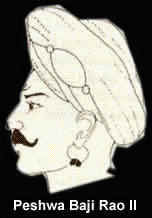Anglo-Maratha Relations and Fall of the Marathas
The Marathas after Kharda and the Second Anglo-Maratha War
 THE victory of the Maratha at Kharda enhanced their prestige and the influence of Nana Fadnavis at Poona. But they were not destined to reap any permanent advantage out of it. It was at Kharda that the Maratha chiefs assembled under the Authority of the Peshwa for the last time. Soon they spoiled all their chances by unwisely indulging in internal quarrels. The young Peshwa, Madhava Rio Narayan, grew tired of Nana’s dictatorship, and, in a fit of despair, committed suicide on the 25th October,1795. The next in succession was Raghoba’s son, Baji Rio II, a bitter foe of Nana. Fadnavis, whose claims were opposed by the minister. This led to various plots and counter-plots till at last Baji Rao II was recognised as the Peshwa and Nana Fadnavis as his chief minister on the 4th December, 1796. Taking advantage of these dissensions among the Marathas, the Nizam recovered the territories that he had been compelled to cede to them after his recent defeat at Kharda.
THE victory of the Maratha at Kharda enhanced their prestige and the influence of Nana Fadnavis at Poona. But they were not destined to reap any permanent advantage out of it. It was at Kharda that the Maratha chiefs assembled under the Authority of the Peshwa for the last time. Soon they spoiled all their chances by unwisely indulging in internal quarrels. The young Peshwa, Madhava Rio Narayan, grew tired of Nana’s dictatorship, and, in a fit of despair, committed suicide on the 25th October,1795. The next in succession was Raghoba’s son, Baji Rio II, a bitter foe of Nana. Fadnavis, whose claims were opposed by the minister. This led to various plots and counter-plots till at last Baji Rao II was recognised as the Peshwa and Nana Fadnavis as his chief minister on the 4th December, 1796. Taking advantage of these dissensions among the Marathas, the Nizam recovered the territories that he had been compelled to cede to them after his recent defeat at Kharda.
Devoid of military qualities, and fond of intrigue, Baji Rao II accentuated the rivalries of the Maratha leaders of the time, by setting one against another. Unfortunately for the Maratha nation, able leaders like Mahadaji Sindhia, Malhar Rao Holkar and Tukoji Holkar had already left this world for ever. Their descendants, like Daulat Rio Sindhia, a nephew and adopted son of Mahadaji Sindhia, and Jaswant Rao Holkar, a natural son of Tukoji, utterly devoid of wisdom, only occupied themselves in mutual quarrels, to the prejudice of national interests, at a time when the Company’s policy of non-intervention had given place to one of aggressive imperialism with the arrival of Lord Mornington (subsequently Marquess Wellesley) as Governor-General on the 26th April, 1798.
An imperialist to the tips of his fingers and possessed of experience of Indian affairs as Commissioner of the Board of Control, Wellesley came to guide the destiny of the Company in India at a time when the political situation in this country was “extremely critical”, as he himself said; and the Company was exposed to grave dangers, due largely to Shore’s policy of neutrality. Tipu, the “ancient enemy of the Company”, had greatly improved his resources, while his spirit of hostility was unabated; the Nizam was “reduced in reputation as well as in real strength” and had welcomed French support, being alienated by the English neutrality in 1795; the power of Daulat Rao Sindhia “had arrived at a most alarming eminence”; the Raja of the Malabar region, with the exception of the Raja of Coorg, were hostile; there was constant apprehension of an invasion of the Indian plains by Zaman Shah, the ruler of Kabul; and the finance of the Company were in an unsatisfactory condition. The influence of the Revolutionary and Napoleonic Wars in Europe added to the gravity of the situation. The French had allied themselves with Tipu, and Napoleon had undertaken an expedition into Egypt with a view to threatening the British position in India
 To save the Company’s position in this menacing situation, and to safeguard and further the interests of the British Empire as a whole, Wellesley followed the policy of subsidiary alliances with regard to the Indian powers. Indeed, the defence of England’s Empire formed the keynote of Wellesley’s policy. His system of subsidiary alliances implied that the Indian powers “were to make no wars and to carry on no negotiations with any other state what soever, without the knowledge and consent of the British Govern- ment. The greater- principalities were each to maintain a native force commanded by British officers for the preservation of the public peace; and they were each-to cede certain territories in full sovereignty to meet the yearly charges of this force. The lesser principalities were to pay a tribute to the paramount power. In return the British Government was to protect them, one and all, against foreign enemies of every sort or kind”. Only a weak power would submit to such an arrangement, and the Nizam, the feeblest of all the Indian powers, readily accepted it. Some other Indian States were also conquered or mediatised by Wellesley. The Marathas had not come into any close ‘ contact with the English since Wellesley’s accession to office. He had asked them on several occasions to enter his system “of defensive alliance and mutual guarantee” but got no response. “Hitherto,” wrote Wellesley in 1800, “either the capricious temper of Baji Rao, or some remains of the characteristic jealousy of the nation with regard to foreign -relations, have frustrated my object and views.” But suddenly the course of affairs, even in Maharishtra, took such a turn as to afford an opportunity to the English to intervene. The shrewd old Maratha statesman, Nana Fadnavis, who had so long done his beat to preserve in some form the solidarity of the Maratha confederacy and had hitherto resisted British interference in Maratha affairs, died at Poona on the 13th March, 1800. “With him,” remarked Colonel Palmer, the British Resident at Poona, with prophetic truth, “departed all the wisdom and moderation of the Maratha Government.” .
To save the Company’s position in this menacing situation, and to safeguard and further the interests of the British Empire as a whole, Wellesley followed the policy of subsidiary alliances with regard to the Indian powers. Indeed, the defence of England’s Empire formed the keynote of Wellesley’s policy. His system of subsidiary alliances implied that the Indian powers “were to make no wars and to carry on no negotiations with any other state what soever, without the knowledge and consent of the British Govern- ment. The greater- principalities were each to maintain a native force commanded by British officers for the preservation of the public peace; and they were each-to cede certain territories in full sovereignty to meet the yearly charges of this force. The lesser principalities were to pay a tribute to the paramount power. In return the British Government was to protect them, one and all, against foreign enemies of every sort or kind”. Only a weak power would submit to such an arrangement, and the Nizam, the feeblest of all the Indian powers, readily accepted it. Some other Indian States were also conquered or mediatised by Wellesley. The Marathas had not come into any close ‘ contact with the English since Wellesley’s accession to office. He had asked them on several occasions to enter his system “of defensive alliance and mutual guarantee” but got no response. “Hitherto,” wrote Wellesley in 1800, “either the capricious temper of Baji Rao, or some remains of the characteristic jealousy of the nation with regard to foreign -relations, have frustrated my object and views.” But suddenly the course of affairs, even in Maharishtra, took such a turn as to afford an opportunity to the English to intervene. The shrewd old Maratha statesman, Nana Fadnavis, who had so long done his beat to preserve in some form the solidarity of the Maratha confederacy and had hitherto resisted British interference in Maratha affairs, died at Poona on the 13th March, 1800. “With him,” remarked Colonel Palmer, the British Resident at Poona, with prophetic truth, “departed all the wisdom and moderation of the Maratha Government.” .











